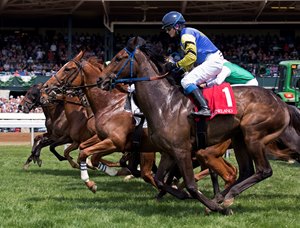Keeneland Initiates Concussion Protocol for Jockeys


Keeneland will require jockeys competing in the 2017 fall meet, which begins Oct. 6, to complete a baseline concussion assessment prior to being allowed to ride. Keeneland is among the first racetracks in the United States to establish concussion management and return to participation protocol.
"Keeneland is proud of this concussion protocol and the collaborative effort that created it," Keeneland vice president of racing and sales Bob Elliston said. "This is another critical step in maintaining the safest possible racing environment for our jockeys."
The move is part of a pilot project between the Jockeys' Guild and the University of Kentucky, funded by a number of Thoroughbred industry organizations. Initially conceived by Keeneland medical director Dr. Barry Schumer and now overseen by Dr. Carl Mattacola, Ph.D. and associate dean of UK College of Health Sciences, the protocol was developed over several years and guidelines were assessed and approved by the Jockeys' Guild Board of Directors.
"Implementation of a mandatory baseline testing protocol and the subsequent guidelines to determine return to participation after a suspected head injury improves medical care and thus prevention of more serious injury," Mattacola said. "This protocol similar to the sports medicine model currently instituted at Pimlico Race Course provides a standard of care and serves as a model for other racetracks to institute. We are grateful to the industry sponsors who helped make this a reality."
The protocol follows guidelines established by the consensus statement on concussion in sport at the Fifth International Conference on Concussion in Sport in Berlin in October 2016. The protocol provides a systematic methodology to assess baseline data so that a return to participation decision can be made using an evidence-based approach similar to such other professional sports as the NFL, NBA, NASCAR, and NCAA.
"It is our belief that head injuries are one of the most pressing issues that jockeys and their families face today," said Terry Meyocks, national manager of the Jockeys' Guild. "Keeneland will initiate the concussion protocols and return to ride guidelines approved by the Jockeys' Guild Board beginning with the Fall Meet. We greatly appreciate the University of Kentucky for conducting this pilot project, as well as the support we received from all of the other racetracks in Kentucky and industry organizations."
Under the guidelines, all jockeys must maintain an active account in the Jockey Health Information System. If a jockey incurs a fall and suspected concussion, he or she will undergo a standardized concussion management assessment, the SCAT-5 (Sport Concussion Assessment Tool), to evaluate physical feeling, symptoms, memory, and cognitive function prior to returning to ride.
Post-injury assessments will be uploaded to the JHIS for comparison and assessment after an incident. The JHIS is a national database of jockeys' updated medical histories so in the event of an injury the records are immediately accessible to emergency personnel at racetracks throughout the country. Schumer developed the concept for the JHIS and worked with the Jockeys' Guild and The Jockey Club to launch the system in 2008.
